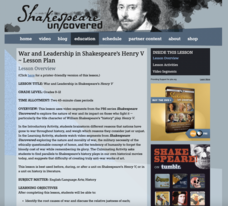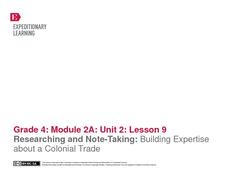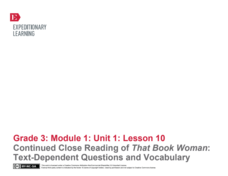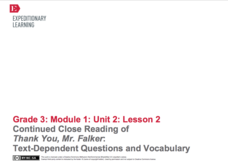Curated OER
Wrinkles ESL Lesson
Practice English vocabulary and dialogue. An ELD class completes a true/false worksheet about aging and wrinkles, then read an article entitled "Wrinkles Give Clues to Bone Condition" using context clues to determine vocabulary...
Curated OER
It's Greek To Me!
For this language lesson, scholars use Greek root meanings to determine the meaning of words. After being shown how Greek roots are used in many words, such as, photosynthesis, pairs are given two excellent black line masters embedded in...
EngageNY
Developing Reading Fluency: Selecting a Text and Practicing Reading Aloud
Young readers continue to strengthen their fluency skills with a text of their choosing. The teacher first engages the class with an audio recording or read-aloud of a short poem, modeling for children how to read fluently. Next it's...
Shakespeare Uncovered
Henry IV, Part I: Does Father Know Best?
“Yea, there thou mak’st me sad and mak’st me sin/In envy that my Lord Northumberland/Should be the father to so blest a son--.” Henry IV, Part I, provides the text for a series of exercises that ask class members to examine the...
Shakespeare Uncovered
Women’s Roles in As You Like It
“There is nothing that becommeth a maid better than soberness, silence, shamefastness, and chastity, both of body & mind.” This line, from Thomas Bentley ‘s The Monument of Matrons published in 1582, typifies the way women were...
Shakespeare Uncovered
War and Leadership in Shakespeare’s Henry V
“Compared to war all other forms of human endeavor shrink to insignificance.” “War is not healthy for children and other living things.” These two views of war, embodied in George Patton’s statement and Lorraine Schneider‘s famous 1966...
EngageNY
Researching and Note-Taking: Building Expertise about a Colonial Trade
Building on the previous activity in this unit on colonial trade, the ninth activity has young experts continuing their research and writing summaries of the information they find. To begin, children participate in guided practice where...
Curated OER
Vocabulary Building
A fabulous language arts lesson has readers focus on the vocabulary in the key words, expand and build new vocabulary, and practice three grammar concepts. They recognize key words as they relate to communicating at work. Pupils build...
Curated OER
Persuasive Writing
Fourth and fifth graders try their hand at persuasive writing. They listen to well-written persuasive articles so they can get a sense of what good persuasive writing is. Then, they brainstorm topics they'd like to write about and are...
EngageNY
Continued Close Reading of Rain School: Text-Dependent Questions and Vocabulary
The engaging story Rain School is further explored in the third lesson of a larger unit that explicitly teaches close reading skills by answering questions whose answers can only be found inside the text. Through teacher modeling and...
EngageNY
Continued Close Reading of That Book Woman: Text-Dependent Questions and Vocabulary
Explicitly explained and delightfully detailed are two ways to describe this tenth lesson plan in a larger unit designed for the first few weeks of third grade. Learners continue to use and develop previously learned close reading...
EngageNY
Continued Close Reading of Thank You, Mr. Falker: Text Dependent Questions and Vocabulary
In the second lesson plan in a series that revolves around the story, Thank You, Mr. Falker, learners practice the skill of answering direct questions from the text while using complete sentences. After a teacher-led review of how to...
EngageNY
Mid-Unit 2 Assessment: Inferring About the Silversmith Trade in Colonial Times
The seventh lesson plan in this unit on colonial trade assesses fourth graders' ability to use details from an informational text to make inferences and create a piece of informative writing. The included assessment begins with learners...
EngageNY
End of Unit 2 Assessment: Working with Two Texts - Reading, Listening, Summarizing, and Synthesizing
As a summative assessment for this unit on colonial trade, fourth graders listen to and read informational texts in order to demonstrate their ability to take notes, write summaries, and draw connections. Young scholars first listen as...
Maine Content Literacy Project
Introduction to The Lottery, by Shirley Jackson
"The Lottery" by Shirley Jackson is a great story to share with your class, and this lesson focuses on just that story! The eighth in a fourteen-lesson series on short stories, the plan has learners study some vocabulary, read the story,...
Curated OER
Lesson Plan: Sensory Exploration
Using their keen eyes and ears, learners build story observation skills which they will use to create sensory detail in their art. They note all of the things they observed on a walk, categorize them by sense, and then use the same skill...
August House
The Archer and the Sun
Reinforce reading comprehension with a instructional activity about The Archer and the Sun, a Chinese folktale. Kids learn some background information about Chinese culture before reading the story, and answer literacy questions as they...
EngageNY
Grade 10 ELA Module 1: Unit 2, Lesson 8
Now what? Class members continue their close reading of Ethan Canin’s short story “The Palace Thief,” focusing on Hundert's feelings about his retirement, and consider what these feelings reveal about his character.
EngageNY
Grade 10 ELA Module 1: Unit 2, Lesson 9
Do our childhood circumstances significantly shape us? As the close reading of “The Palace Thief” continues, groups examine how the results of the first "Mr. Julius Caesar" competition influenced the development of the characters in...
EngageNY
Grade 9 ELA Module 1: Unit 3, Lesson 17
Romeo and Juliet, Act 5, Scene 3, lines 139-170, is the focus of this day's lesson plan. Readers examine the dramatic irony in Juliet's comments and consider how "lamentable chance" caused by a "greater power" plays a role in the tragedy.
Southern Nevada Regional Professional Development Program
Focus: The Paideia Seminar
Compelling discussions are the result of open-ended, challenging questions. An introduction to Paideia discussions includes explicit directions about how to prepare readers and how to model the kinds of questions they should develop in...
Premier Literacy
Point of View
Incorporate technology into a literature activity with an innovative language arts activity. Middle schoolers read an electronic version of original stories or fairy tales, and after determining the point of view, rewrite the tale from a...
Turabian Teacher Collaborative
Parts of Argument III: The Claim Game
Throw down with a fun language arts game! Armed with a hand of writing-themed cards, learners craft arguments based on the strategies written on the cards, dropping cards as they discuss their claims further until there are no strategies...
Curated OER
Grammar Lesson Plan: Simple Past vs. Present Perfect
What's the difference between the present perfect and simple past? Have your class practice identifying and using both of these verb tenses through pair activities, whole-class discussion, and a worksheet.

























